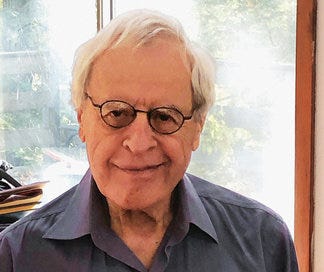Below is a short memoriam for the American poet Charles Simic, who died a few years ago. The term “original,” like all terms that used to mean something, is casually thrown about nowadays to praise everything from socket wrenches to peanut butter, but in Charlie’s case the term is appropriate. He completely changed the way poetry was written, received, and translated in the early 1970s and afterwards. He was also a terrific essayist, often darkly comic as he lambasted our cultural idiocies.
Below is my earliest memory of Charlie, quite appropriately gotten from my first reading of his work. Years later, when I asked him to write a blurb for my first book of prose poems and he said he’d write an introduction instead, I was honored.
After my reflection, I reprint one of Charlie’s poems, along with him reading it. I end with a prose poem I wrote as a homage to his style and preoccupations.
What to say about Charlie Simic? Great poet, translator, critic, and essayist. Philosopher of that 3 a.m. wake-up call when, all alone, one contemplates the ironies and cosmic jokes of the universe, when the image of the face of God looking down on you may really just be an apparition brought on by bad sausage. Yes, he was brilliant, but, more important, he was a good guy—kind, generous, and humble in a field of blowhards, a field that often doesn’t reward humility. Charlie had to have been aware of his brilliance, but his playful self-deprecation always kept any threat of egoism at bay.
It was 1975 and I was twenty-five. I had just arrived at the University of New Hampshire to begin a masters program in literature. Someone mentioned Charlie’s work to me, so I bought Dismantling the Silence and Return to a Place Lit by a Glass of Milk and went on the two-and-a-half hour Mt. Washington boat ride around Lake Winnipesaukee.
Lost in those books, I don’t remember sight-seeing much that day. You can write poems like these? I thought. And you can be funny to boot? I couldn’t wait to get home and write down all my so-called profound ideas in a similar simple style. Which of course ended up being an impossible, even dumb, expectation. And yet those two books gave me permission to discover my own voice and feel free to juxtapose the learned and quotidian, to write a poem with the Pope and President standing next to each other wearing “I’m With Stupid T-shirts.” And as I discovered later, after speaking with Charlie, I could even do it in a prose poem.
In short, there would be no Peter Johnson prose poems if I hadn’t read Charlie on that boat ride, and subsequently met him and studied under him and, afterwards, befriended him. Now you might argue that it would be a good thing if there wasn’t a Peter Johnson prose poem, but there you have it.
James Tate, Bill Knott, my dear friend Russell Edson, and now Charlie (my literary forefathers!)—all gone, but no need for sadness with their inventive, and often comical, books out there to read over and over again. These are the books I’ll take with me on that last boat ride with Charon at the helm. No wait, it’s not Charon at all, just Charlie with his impish smirk wanting to get home quickly so he can keep scribbling in the dark.
Listen to Charlie reading his “Cameo Appearance” to see all his gifts at work.
And now my homage to Charlie:
“Museum of Hard Knocks” by Peter Johnson
(for Charles Simic)
In a museum far away people stare at a slab of lard encased in a plastic container, trying to make sense of it.
A man in a faux-python tank top contemplates a blue neon sign with “Handsome Hansom” scrawled across it.
He’s sick of beating his wife, angry they arrested his pet alligator for chewing on a neighborhood toddler.
The woman he’s come to meet is howling under an enormous tinfoil moon.
She’s crazy, but prettier than any planet you can imagine.
The New Curator stands quietly in the middle of the room.
The Old Curator’s impaled on a pitchfork positioned upside down in a pile of leaves.
When you push a button a child’s voice croons, “It’s easy to die when you know you’re going to rise from the dead.”
In this garden, there is no serpent to blame.
Just a bald, tuxedoed museum guard manning the exit door, barking out, as he boots people into the night: “And now for some real pain.”
[From While the Undertaker Sleeps: Collected and New Prose Poems, by Peter Johnson]
You can find Peter Johnson’s books, along with interviews with him, appearances, and other information at peterjohnsonauthor.com
His most recent book of prose poems is While the Undertaker Sleeps: Collected and New Prose Poems
His most recent book of fiction is Shot: A Novel in Stories
Find out why he is giving away his new book of prose poem/fragments, even though he has a publisher for it, by downloading the PDF from the below link or going to OLD MAN’S homepage. His “Note to the Reader” and “Introduction” at the beginning of the PDF explains it all: Observations from the Edge of the Abyss





I'm not a great fan of Pound or Zukofsky, but W.C. Williams is often thrown in there, and his work is what made me write poetry, and the Beats are often seen as descendants, and I like many of them.
The amazing, amazing, amazing Charles Simic. One of my very favorites. And has a poet ever said goodbye so perfectly? His last poem in his last book...
The Wind Has Died
My little boat,
Take care.
There is no
Land in sight.